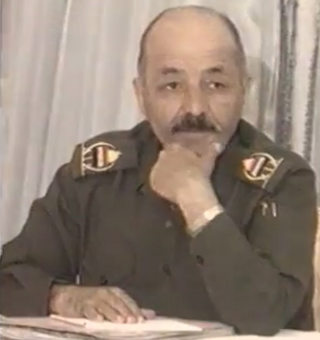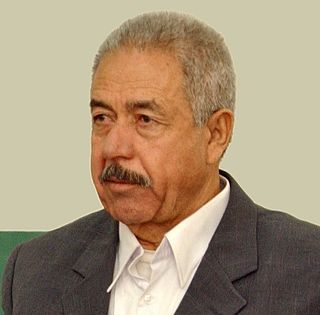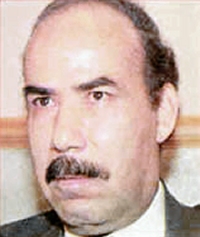Related Research Articles

Saddam Hussein was an Iraqi politician and revolutionary who served as the fifth president of Iraq from 1979 to 2003. He also served as prime minister of Iraq from 1979 to 1991 and later from 1994 to 2003. He was a leading member of the revolutionary Arab Socialist Ba'ath Party and later its Iraqi regional branch. Ideologically, he espoused Ba'athism, a mix of Arab nationalism and Arab socialism, while the policies and political ideas he championed are collectively known as Saddamism.

Tariq Aziz was an Iraqi politician who served as Deputy Prime Minister (1979–2003), Minister of Foreign Affairs (1983–1991) and a close advisor of President Saddam Hussein. Their association began in the 1950s when both were activists for the then-banned Arab Socialist Ba'ath Party. He was both an Arab nationalist and a member of the Chaldean Catholic Church.

Taha Yasin Ramadan al-Jizrawi was an Iraqi politician and militia commander, who served as one of the three vice presidents of Iraq from March 1991 to the fall of Saddam Hussein in April 2003.

Ali Hassan Majid al-Tikriti, nicknamed Chemical Ali, was an Iraqi military officer and politician under Saddam Hussein who served as defence minister, interior minister, and chief of the Iraqi Intelligence Service. He was also the governor of Kuwait during much of the 1990–91 Gulf War.
Aziz Saleh al-Numan al-Khafaji was an Iraqi Ba'ath Party Regional Command Chairman. He was appointed Iraqi governor of Kuwait by Saddam Hussein during the 1991 Gulf War; taking over the post from Ali Hassan al-Majid in November 1990, and holding it until 27 February 1991. He previously served as Governor of Karbala (1976–1979), Governor of Najaf (1979–1986) and Minister of Agriculture (1986–1991).

Izzat Ibrahim al-Douri was an Iraqi politician and army field marshal. He served as Vice Chairman of the Iraqi Revolutionary Command Council until the 2003 U.S. invasion of Iraq and was regarded as the closest advisor and deputy under President Saddam Hussein. He led the Iraqi resistance group Naqshbandi Army.

Mohammed Hamza az-Zubeidi was an Iraqi military officer and politician who served as the Prime Minister of Iraq from 1991 to 1993. He is on the "Saddam's Dirty Dozen" list of people responsible for torture and murder in Iraq, playing a key role in Iraq's brutal suppression of the 1991 Iraqi uprisings. He was featured in Iraqi news film kicking and beating captured rebels.

Barzan Ibrahim Hassan al-Tikriti, also known as Barazan Ibrahim al-Tikriti, Barasan Ibrahem Alhassen and Barzan Hassan, was one of three half-brothers of Saddam Hussein, and a leader of the Mukhabarat, the Iraqi intelligence service. Despite falling out of favour with Saddam at one time, he was believed to have been a close presidential adviser at the time of his capture by U.S. forces in 2003. On 15 January 2007, Barzan was hanged for crimes against humanity. He was decapitated by the hangman's rope after errors were made calculating his body weight and length of drop from the platform.
In April 2003, the United States drew up a list of most-wanted Iraqis, consisting of the 55 members of the deposed Ba'athist Iraqi regime whom they most wanted to capture. The list was turned into a set of playing cards for distribution to United States-led Coalition troops. Later, in 2003, the list was renumbered so that it mostly conformed to the order of the playing cards.

During the 2003 invasion of Iraq by a United States–led coalition, the U.S. Defense Intelligence Agency developed a set of playing cards to help troops identify the most-wanted members of President Saddam Hussein's government, mostly high-ranking members of the Iraqi Regional Branch of the Arab Socialist Ba'ath Party or members of the Revolutionary Command Council; among them were some of Hussein's family members. The cards were officially named the "personality identification playing cards". As of 2021, all but four of the 52 most wanted have either died or been captured, eleven of whom have been released.

Muqtada al-Sadr is an Iraqi Shia Muslim cleric, politician and militia leader. He inherited the leadership of the Sadrist Movement from his father. He founded the now dissolved Mahdi Army militia in 2003 that resisted the American occupation of Iraq. He also founded the Promised Day Brigade militia after the dissolution of the Mahdi Army; both were backed by Iran. In 2014, he founded the Peace Companies militia and is its current head. In 2018, he joined his Sadrist political party to the Saairun alliance, which won the highest number of seats in the 2018 and 2021 Iraqi parliamentary elections.

Amir Hamudi Hasan al-Saadi or Amer al-Sadi, "the organizational genius behind the Iraqi superweapons program," was Saddam Hussein's liaison with the UN inspectors in the runup to the 2003 invasion of Iraq. Like the defector Hussein Kamel al-Majid, he insisted Iraq had destroyed its prohibited weapons. He was dismissed by the US as a liar. There was a subsequent failure to uncover weapons of mass destruction by the Iraqi Survey Group.

An Iraqi insurgency began shortly after the 2003 American invasion deposed longtime leader Saddam Hussein. It is considered to have lasted until the end of the Iraq War and U.S. withdrawal in 2011. It was followed by a renewed insurgency.

Lieutenant General Abid Al-Hamid Mahmud al-Tikriti was an Iraqi military officer and Saddam Hussein's personal secretary.

The Badr Organization, previously known as the Badr Brigades or Badr Corps, is an Iraqi Shia Islamist and Khomeinist political party and paramilitary organization headed by Hadi al-Amiri. The Badr Brigade, formed in 1982 and led by Iranian officers, served as the military arm of the Supreme Council for Islamic Revolution in Iraq (SCIRI), a Shia Islamic party based in Iran. The Badr Brigade was created by Iranian intelligence and Shia cleric Mohammad Baqir al-Hakim with the aim of fighting the Ba'athist regime of Saddam Hussein during the Iran–Iraq War. Since the 2003 US-led invasion of Iraq, most of the Badr Brigade fighters have entered the new Iraqi army and police force. Since 2003, the Badr Brigade and SCIRI were considered to be one party, but have recently unofficially separated with the Badr Organization now being an official Iraqi political party. Badr Brigade forces, and their Iranian commanders, have come to prominence in 2014 fighting the Islamic State of Iraq and the Levant (ISIL) in Iraq. It is a part of the Popular Mobilization Forces.

Taha Muhie-eldin Marouf was an Iraqi-Kurdish politician who served as the vice president of Iraq from 1974 until the U.S. invasion in April 2003.

There are various rationales for the Iraq War that have been used to justify the 2003 invasion of Iraq and subsequent hostilities.

The Iraq War, also referred to as the Second Gulf War, was a prolonged conflict in Iraq lasting from 2003 to 2011. It began with the invasion by a United States-led coalition, which resulted in the overthrow of the Ba'athist government of Saddam Hussein. The conflict persisted as an insurgency arose against coalition forces and the newly established Iraqi government. US forces were officially withdrawn in 2011. In 2014, the US became re-engaged in Iraq, leading a new coalition under Combined Joint Task Force – Operation Inherent Resolve, as the conflict evolved into the ongoing insurgency.

Iraq, officially the Republic of Iraq, is a country in West Asia and a core country in the geopolitical region known as the Middle East. With a population exceeding 46 million, it is the 35th-most populous country. It consists of 18 governorates. The country is bordered by Turkey to the north, Saudi Arabia to the south, Iran to the east, the Persian Gulf and Kuwait to the southeast, Jordan to the southwest, and Syria to the west. The capital and largest city is Baghdad. Iraqi people are diverse; mostly Arabs, as well as Kurds, Turkmen, Yazidis, Assyrians, Armenians, Mandaeans, Persians and Shabakis with similarly diverse geography and wildlife. Most Iraqis are Muslims – minority faiths include Christianity, Yazidism, Zoroastrianism, Mandaeism, Yarsanism and Judaism. The official languages of Iraq are Arabic and Kurdish; others also recognized in specific regions are Turkish, Assyrian, and Armenian.

Ahmad Abousamra, known also as Abu Sulayman ash-Shami and Abu Maysarah ash-Shami, was a Syrian-American Islamic militant and ideologue who served as the chief editor of the Islamic State of Iraq and the Levant's Dabiq magazine. In 2013, he was placed on the US Federal Bureau of Investigation's 'most wanted list' and made the subject of a $50,000 reward because of his connections to a Massachusetts terrorism investigation centering on his alleged close associate Tarek Mehanna, who was arrested in 2009 and convicted of terrorism-related charges in a Boston court in late 2011. He was featured on the FBI's Most Wanted Terrorists list for allegedly attempting to obtain military training in his trips to Yemen and Pakistan for the purpose of killing American soldiers overseas.
References
- ↑ "Most-wanted Iraqi card deck: Where are they now?". WPTV News Channel 5 West Palm. 2015-04-22. Retrieved 2024-10-17.
- ↑ "Iraq Most Wanted Fast Facts". CNN. 2013-10-30. Retrieved 2024-10-17.
- ↑ "U.S. captures another of Iraq's most wanted". NBC News. 2004-02-10. Retrieved 2024-10-17.